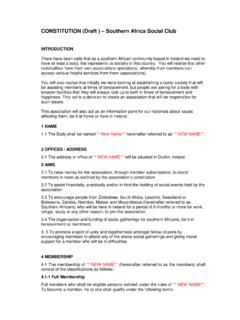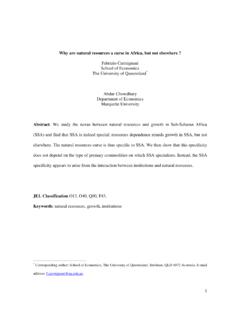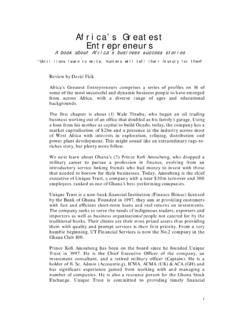Transcription of History of Christianity in Africa - Philadelphia Project
1 This article deals with the History of missionary work in Africa , from Biblical times tothe eighteenth century. Missionary work in Southern Africa is discussed in aseparate article, while the information box with the second article providesinteresting of Christianity in AfricaHistory of Christianity in AfricaSummarySummaryThe Christian evangelical message reached Africa centuries before it became known in America,Australasia, the Far East and many other parts of the world. However, the Gospel was preachedmainly in the northern parts of Africa and large parts of the continent had to wait for more than 1900 years before they heard the Christian message for the first time. Even though it took some timein reaching them, the large numbers of Africans who accepted the Christian religion in thetwentieth century - and still today - are considered to be one of the major victories in the History ofthe Christian Church (see articles: " History of the Christian Church I, II, III and IV).
2 Although missionaries had been actively preaching the Gospel for many centuries, statistics showthat by the end of the 1900 only about 10% of the African population had accepted Christianity . Inthe twentieth century - mostly in the last few decades - this radically changed. Statistics now showthat more than 60% of the African population south of the Sahara consider themselves to beChristians. With the dawn of the twenty-first century Christianity is still the fastest growing religionin : Old map of to AfricaGospel to AfricaThe first "messenger" of the Gospel in Africa is possibly the Ethiopian official who was evangelisedand baptized by Phillip on the road between Jerusalem and Gaza (Acts 8:26-40). Although theBible does not mention it, legend has it that the official returned to his country, where heestablished the first Christian Church in is interesting to note that although many people accept this as the beginning of the modernEthiopian church, experts claim that the region then known as Ethiopian and the country as weknow it today are not the same.
3 According to them, the official actually came from Nubia (situatedin the territory known today as Sudan) and it was in this region that he established the first the sixth century the Church in Nubia experienced a phenomenal growth period afterseveral missionaries were sent to the region. Over time Nubia became a predominantly Christiankingdom. With the expansion of Islam (by 710 AC large part of northern Africa was ruled byIslamic Arabs) clashes between Nubia and the Muslims became more frequent. By 1000 AC Nubiawas divided into two kingdoms - a northern (Makurra) and a southern (Alwa) kingdom. In 1275the capital of Makurra was captured by the Egyptians. The Muslims victimized the Christianpopulations in almost every African country that they conquered and by the seventeenth centurymost of the Christians had converted to Islam to such a degree that the Nubian church is interesting to note that Sudan, although it was declared an Islamic state in 1983, is stilldivided in an "Islamic" north (65% of the population) and a "Christian" south (23% of thepopulation).
4 EgyptAn earlier well-known missionary to Africa was the apostle Mark, who founded the first church inAlexandria, Egypt, in 65 AC. The first members of this church were Jews and Greeks, but as timepassed large numbers of Egyptians also converted to Christianity . By 300 AC there were more than250 congregations in North Africa . The same church broke away from the Eastern Church to formthe Coptic Church of of the persecution of Christians by the Roman Emperor, many believers joined smallercommunities and settled in the desert. These Christian groups were very committed to theirreligion and lived in total seclusion. This lead to the founding of monasteries that were later alsoinstituted by European : Pyramids in growth of Christianity in Egypt came to an end and was later reversed when the IslamicArabs conquered the county in 641 AC.
5 Christians were persecuted and restrictions were placedon their freedom to practice their beliefs (for example, they had to pay special taxes, could notbecome government officials and were prohibited from erecting church buildings or preachingthe gospel in public). The Coptic Church of Egypt is still the largest Christian group in the 11,5% of the total population of 70 million people are first missionary who preached the Gospel in Abyssinia (the modern state of Ethiopia) wasFerments. In the fourth century he traveled to India and had to work as a slave in theadministration of King Axiom, the ruler of Abyssinia. During his term as a slave he preached theGospel of Christ to the Abyssinians and was later set free and allowed to start a church. He startedoff as the pastor of the church, but later (356 AC) became Church in Ethiopia was different from other churches planted in the early centuries in that itremained relatively strong despite efforts to destroy it.
6 These attempts included conquests by theMuslims, efforts to unify the Coptic Church with the Roman Catholic Church and persecution bythe Marxist government between 1974 and 1991). The result is that today 65% of the Ethiopianpopulation are Christian. The Coptic Church of Ethiopia is still the largest group. Approximately58% of the country's total population of 63 million people belong to the Coptic Church (also seearticle entitled: "Rastafarianism").Missionary work in West Africa (1420-1780)Missionary work in West Africa (1420-1780)While Christianity grew in Europe and large parts of Northern Africa and even in the East, the restof Africa continued to practice their traditional believes for many centuries. Developments inshipping and exploratory voyages to discover new worlds assisted the Church in its efforts to reachhitherto neglected parts of the African 1421 and 1445 Prince Henry the Navigator commissioned at least ten voyages in anattempt to find an alternative route to India.
7 During similar efforts at the same time and later,Portuguese sailors made contact with various tribes along the coast of West Africa . In 1462 thePope in Rome appointed a missionary prefect to promote missionary work in West Portuguese missionaries experienced their first major breakthrough in 1492 whenManikongo, king of the Bakongo tribe (in the region that today forms part of the southern regionsof the Republic of Congo and Northern Angola), and many of his followers converted toChristianity. His successor, Alphonso, declared the Congo a Christian kingdom and many of hissubjects went to study the priesthood and government administration in factors, including the fact that the Portuguese bought slaves from the Angolans justsouth of the Congo and that many slaves were abducted from the Congo, led to the decline ofthe Church in Congo.
8 By 1700 Christianity had disappeared from this 1750 Thomas Thompson from the Society for the Propagation of the Gospel (SPG) inEngland became the first Protestant missionary on the west coast of Africa . He worked in thecoastal regions of modern-day Ghana, but had to return to England after four years because ofbad health. One of his converts, Philip Quaque, returned with him to further his studies. Quaquebecame the first African to be ordained as a preacher in the Anglican Church. He was also the firstAfrican who was accepted by the SPG and sent out as missionary to work among his own peoplein West Christian Church and many of its missionaries played an important role in restricting andlater abolishing slavery worldwide. In 1787 a group of British Christians founded a settlement forfreed slaves - Freetown - on the west coast of Sierra Leone.
9 Missionaries from the Church MissionSociety (CMS) and later also of the Wesleyan Methodist Missionary Society (WMMS) achieved greatsuccess early in the nineteenth century, not only with the spreading of the Gospel to tribes andgroups in these regions, but also in the establishment of schools, a university college and variousindigenous Christian work in East Africa (1560-1700)Missionary work in East Africa (1560-1700)The first missionary to work in East Africa was one Da Silveira who landed on the east coast ofmodern-day Mozambique in 1560. He continued on foot inland to work among the Monomotapatribesmen. Muslim traders, who bought gold from the King of the Monomotapa, convinced himthat Da Silveira was a clever witchdoctor who wanted to place a curse on him through afterwards the King ordered Da Silveira killed through missionaries followed in Da Silveira's footsteps and in 1652 the King of Monomotapa wasbaptised as a Christian.
10 Nevertheless, no other major breakthroughs followed and Christianityfaded when the missionaries left the 1500 and 1700 various Portuguese missionary groups moved northwards on thecoast of East Africa , but their efforts to evangelise these regions were not successful. Some successwas achieved in Mombassa (modern day Kenya), but by 1700, when the Portuguese strongholdon East Africa started to slip, the Roman Catholic Church's' work on the east coast of Africa came toa halt.(For more information about the missionary movement in Southern Africa read the article:"Christian missions in Africa II: Southern Africa ".)Missionary work in Southern Africa (1652-1840)Missionary work in Southern Africa (1652-1840)One of the main aims of the founding of the Dutch trading post at the Cape of Good Hope(modern-day Cape Town) in 1652 was to reach the indigenous population living on thesouthernmost tip of Africa with the Gospel of Jesus Christ.





